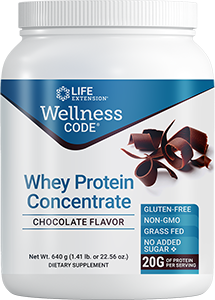
16 Foods to Stop Unhealthy Cravings
Published: October 2021
"I'm craving a nice bowl of broccoli," said nobody ever. It's not that a wholesome serving of fresh greens isn't enjoyable—even something you might look forward to at dinner, with a little sea salt and extra-virgin olive oil. But crave? Let's be honest: the kinds of food that tempt us to abandon our healthy weight goals don't look like little green trees…and they aren't usually apples, beans, or grilled chicken breast, either.
Indeed, what sends us back to the pantry for more usually comes in crinkly, brightly colored wrappers—and sometimes leaves orange cheese dust on our fingertips.
That's because these salty (and sweet) treats tend to be hyperpalatable—which is a fancy word for foods that have been carefully engineered with extra sugar or fat to induce cravings.
So what do you do when you're jonesing for junk food but you're trying to stick to a diet? Should you indulge your appetite, or stand strong? It's a bit of a double-edged sword. Give in to the cravings, and you may end up feeling like a failure—and that sense of defeat can trigger a fresh new cycle of emotional eating that will lead you to eat even more regret-inducing food. But deny the craving altogether, and you might feel deprived…which, ultimately could backfire into an all-out binge.
There's a third option, however: instead of eating the unhealthy food you crave, eat a healthier food that defeats the craving.
Do such foods exist? Yes! In fact, we can think of 16 of them, to be specific.
What causes food cravings?

You don't have to eat a tasty treat too many times to start craving it. That's because when you enjoy something sweet, salty, or high in fat (or, all of the above), your body releases the "feel good" neurotransmitter, dopamine. Your brain then associates this food as a "reward," and encourages you to repeat this behavior to get the feeling of satisfaction again and again.
When you're feeling down or stressed, you might find that those food cravings are more intense than others. There's a reason why we call certain foods "comfort foods"—there's nothing quite like the dopamine rush that comes from eating a creamy bowl of mac and cheese to offset those negative feelings.
What is emotional eating?
In an ideal world, there's a clear link between hunger and satiety: we're hungry because our body is releasing ghrelin, which is a message to our brain essentially announcing, "It's time to eat!" and we do exactly that, until we're satisfied.
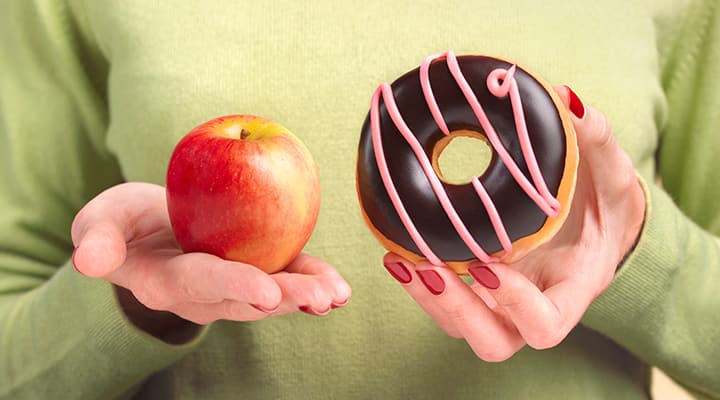
But we don't always eat when we're hungry, and we don't always stop when we are satiated. Many of us eat when we're sad, stressed, or bored—because we want to boost our mood, cope with a problem, fill a void…all things that have nothing to do with whether we actually need to eat at that particular moment in time. Even when we get that message from our body that it's time to put the fork down…sometimes, after a really rough day, we don't stop until the plate is empty, and maybe even go for seconds.
This is called emotional eating, and one way to distinguish it from a physiological desire to eat (a.k.a. physical hunger) is that your food cravings will be especially intense. You'll find yourself wanting something sweet or salty, and we're not talking about a nice crisp apple, or some lightly salted edamame.
When this happens, it's a good idea to pause, think about what's really motivating your increased appetite, and see if there's a non-food way to deal with these emotions—whether it's taking a walk, calling a friend to vent, or cuddling your dog.
Tip: Make sure that at mealtime, you are eating enough nutrient-dense food, so that you're not compounding an emotional food craving with actual physical hunger; satiety from a well-rounded diet goes a long way towards keeping your appetite in check, even when your emotions are in overdrive!
What foods trigger cravings?
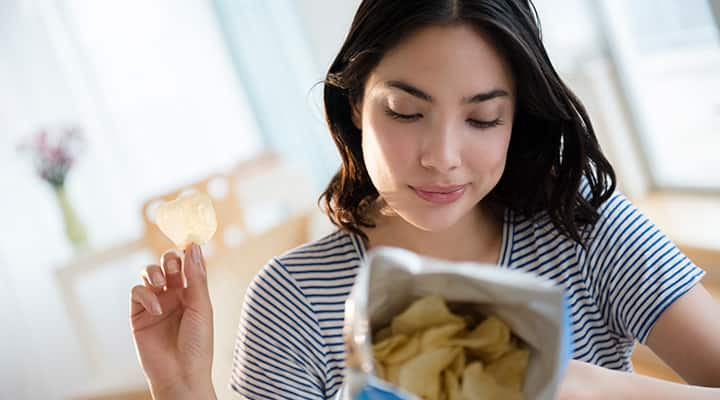
Those hyperpalatable treats we tend to crave the most are usually processed foods like potato chips, crackers, cookies, ice cream, soft drinks and fast food favorites—in other words, foods that are full of sugar, fat, sodium, or all three, and often made in a factory rather than from scratch in your kitchen. Just watching a TV commercial for your favorite snack or drive-through haunt might be enough to get you salivating!
Particularly if you're trying to avoid weight gain, just because you find yourself hankering for a hot fudge sundae or frantically wanting fries doesn't mean you have to eat these foods—nor does it mean you have to feel unsatisfied.
Here are healthy alternatives for every kind of "fix" you might be seeking, whether salty or sweet.
Explore Our Best Weight Management Supplements
8 healthy foods to curb sugar cravings
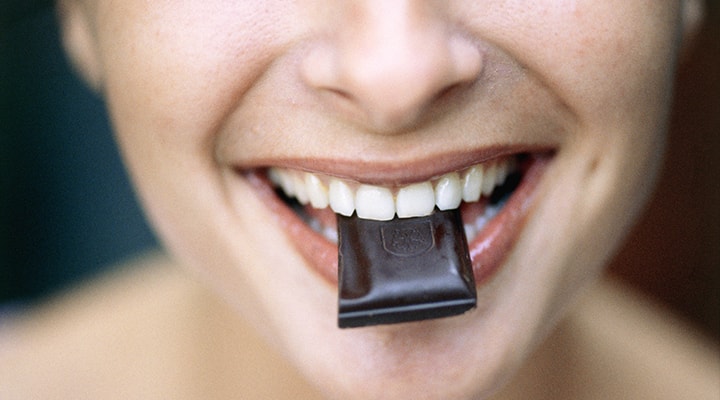
Dark chocolate
—Chocoholics, rejoice! Many women say this is their number one food craving…but we all know that devil's food cake has a way of bedeviling those healthy eating plans. Even if you're on a diet, though, you can still enjoy chocolate…the dark kind. Treat yourself to a few squares of 70% or higher cocoa—which has wonderful antioxidant properties.Fresh fruit
—Before you bite into a candy bar, see if snacking on a piece of fruit does the trick. Maybe you're not daydreaming about apples or bananas, but once you take a bite, you might rediscover how tasty fresh produce can be. Add a tablespoon of peanut butter or a sprinkle of chopped nuts for a more satiating snack that won't sabotage your diet.Berries
—Instead of reaching for the jelly beans or other sugary foods, dive into a bowl of fresh berries, which taste sweet despite being low in sugar. These brightly colored, antioxidant-rich little gems are a great source of fiber, which helps control your appetite.Greek yogurt
—A high-protein yogurt is a great way to keep your hunger in check, and is a much healthier option than a big bowl of ice cream when you're seeking something cold and creamy. Just make sure you choose an option without added sugar—you can always add in some fresh fruit for taste.Part-skim ricotta cheese
—Another good source of protein that has a naturally sweet flavor is ricotta cheese. Spread it over wholegrain or sprouted grain toast (aka a healthy source of carbohydrates) with a sprinkle of cinnamon and a dab of honey for a treat that will keep you satisfied for hours.Protein powder treats
—Instead of eating a cookie, whip up a yummy recipe using protein powder and other healthy ingredients, like fruit and oats or other whole grains. With 20 grams of protein per serving and no added sugar, Wellness Code® Whey Protein is a great option for baking a nutritious treat.Legumes
—You're craving brownies and we're telling you to eat beans…really? Just hear us out! Studies show that plant-based protein is especially good at keeping hunger pangs at bay. Alternatively, try ground legume flour (like garbanzo) instead of a refined white flour when you just can't stop yourself from baking.Chia pudding
—If pudding is one of your favorite desserts, give chia pudding a try. Chia seeds are rich in protein, and when soaked overnight in your favorite milk or non-dairy milk, they take on a velvety, gelatinous texture. We love this pumpkin seed chia pudding recipe.
8 healthy foods to curb your salty cravings
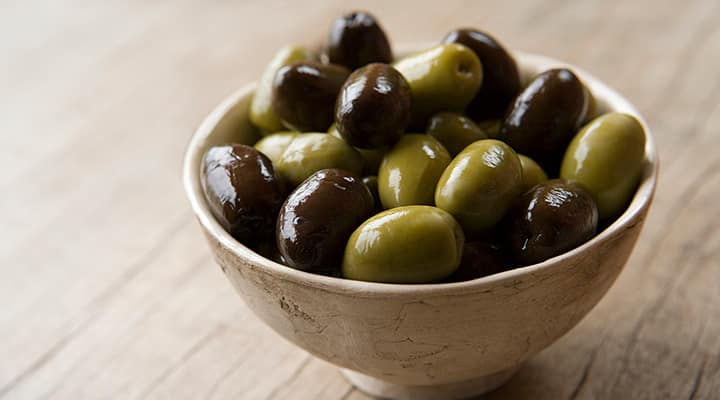
Raw vegetables
—What is it you like most about those potato chips? Is it the saltiness…or is it the sound of them crunching in your mouth? If what you really enjoy is that "snap" of your jaw as your teeth grind into your food, try eating raw carrots, celery or chopped up bell peppers the next time you crave junk food.Lean deli meat
—Cold sliced turkey is a great choice when you want something salty—it's high in protein and low in fat and calories, making it a great choice if you're on a diet or are just trying to eat healthy. If possible, choose a nitrate free option.Hardboiled eggs
—High in protein and energizing vitamin B12, hardboiled eggs are portable, satiating snacks that can be seasoned with cayenne pepper, sea salt, and other fun spices that will add a real kick to your afternoon nosh session.Olives
—There's nothing as satisfyingly salty as a tender, juicy olive, whether you prefer the kalamata variety, or you like your olives black. Olives have health benefits similar to extra virgin olive oil, and just a handful of them can be very satisfying.Sardines
—These snackable little fish are the perfect solution to your salty cravings. Compared to potato chips or French fries, sardines contain nutrients such as vitamins B12 and D, iron, calcium, and omega-3 fatty acids.Baked squash slices
—Instead of eating French fries, give this food swap a try: chop up your favorite kind of squash (zucchini, acorn, butternut) into thin, fry-shaped slices, sprinkle with sea salt, add a drizzle of olive oil, then bake in the air fryer. You'll end up with a snack that has the texture of fries, but without the calories.DIY French fries
—If you've really got an appetite for fries, go ahead and make your own. Just be sure to bake them and not fry them. Potatoes are a great source of vitamins C, B and potassium…they do have more calories than non-starchy vegetables, though, so keep an eye on portions.Avocado toast
—Instead of chips and guacamole, try spreading whole grain bread with fresh avocado, which is a great source of magnesium, not to mention tasty!
Are food cravings linked to vitamin and mineral deficiencies?
Yes, it's possible that your appetite for salty foods is due to a deficiency in sodium…but the far more likely explanation is that it's your brain and not your body that's telling you to eat those fries. Emotional eating is the much more likely culprit behind your unhealthy food cravings.
If you think you could have nutrient deficiencies, your best route is to voice these concerns to your doctor or a registered dietitian, who can order laboratory testing, take a deep dive into your current food intake—and make sure your diet includes what you need to nourish your body, while avoiding weight gain!
References
- Di Mattia, Carla D et al. "From Cocoa to Chocolate: The Impact of Processing on In Vitro Antioxidant Activity and the Effects of Chocolate on Antioxidant Markers In Vivo." Front Immunol, September 2017, https://pubmed.ncbi.nlm.nih.gov/29033932/
- Douglas, Steve M. et al. "Low, moderate, or high protein yogurt snacks on appetite control and subsequent eating in healthy women." Appetite, January 2013, https://pubmed.ncbi.nlm.nih.gov/23022602/
- Frayn, Mallory et al. "Emotional Eating and Weight in Adults: a Review." Current Psychology, March 2017, https://link.springer.com/article/10.1007/s12144-017-9577-9
- Heneghan, Clara et al. "The Effect of Berry-Based Food Interventions on Markers of Cardiovascular and Metabolic Health: A Systematic Review of Randomized Controlled Trials." https://pubmed.ncbi.nlm.nih.gov/29105295/
- Innes, Jacqueline K. et al. "Marine Omega-3 (N-3) Fatty Acids for Cardiovascular Health: An Update for 2020" Int J Mol Sci.,February 2020, https://www.ncbi.nlm.nih.gov/labs/pmc/articles/PMC7072971/
- Kristensen, Marlene D. "Meals based on vegetable protein sources (beans and peas) are more satiating than meals based on animal protein sources (veal and pork) - a randomized cross-over meal test study." Food Nutr Res., October 2016, https://pubmed.ncbi.nlm.nih.gov/27765144/
- Lanza, Barbara et al. "Antioxidants in Extra Virgin Olive Oil and Table Olives: Connections between Agriculture and Processing for Health Choices." Antioxidants (Basel), January 2020, https://www.ncbi.nlm.nih.gov/labs/pmc/articles/PMC7023406/
- Leidy, Heather J. et al. "The effects of consuming frequent, higher protein meals on appetite and satiety during weight loss in overweight/obese men." Obesity (Silver Spring), April 2011, https://pubmed.ncbi.nlm.nih.gov/20847729/
- Réhault-Godbert, Sophie et al. "The Golden Egg: Nutritional Value, Bioactivities, and Emerging Benefits for Human Health." Nutrients, March 2019, https://pubmed.ncbi.nlm.nih.gov/30909449/
- Robertson, Tracey M et al. "Starchy Carbohydrates in a Healthy Diet: The Role of the Humble Potato." Nutrients, November 2018,https://pubmed.ncbi.nlm.nih.gov/30441846/
- Singh, Minati. "Mood, food, and obesity." Front Psychol., September 2014, https://pubmed.ncbi.nlm.nih.gov/25225489/
- Sinha, Rajita. "Role of addiction and stress neurobiology on food intake and obesity." Biol Psychol., January 2018, https://pubmed.ncbi.nlm.nih.gov/28479142/
- "Cravings." Harvard School of Public Health, 2021, https://www.hsph.harvard.edu/nutritionsource/cravings/
Always be in the know!
Access the latest deals, wellness news, expert health tips & more!

